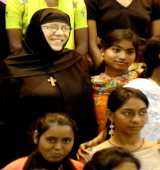Deprecated: trim(): Passing null to parameter #1 ($string) of type string is deprecated in
/home/aoiusa/public_html/wp-content/plugins/sexybookmarks/public.php on line
388
Deprecated: trim(): Passing null to parameter #1 ($string) of type string is deprecated in
/home/aoiusa/public_html/wp-content/plugins/sexybookmarks/public.php on line
394
Deprecated: trim(): Passing null to parameter #1 ($string) of type string is deprecated in
/home/aoiusa/public_html/wp-content/plugins/sexybookmarks/public.php on line
400
 Source: First Things
Source: First Things
Catholic writer R.R. Reno explains why he became a social conservative. Catholic social teaching has always stressed a “preferential option for the poor” which certainly conforms to Orthodox moral teaching particularly in reference to Matthew 25. Where it gets hazy however is when we discuss how policy should be crafted that meets this obligation. Some Catholics, particularly liberals, embrace the Progressive social agenda taking Progressive rhetoric about care for the poor at face value. Orthodox liberals do the same thing.
Reno used to be in that camp until he came to see that care for the poor cannot be reduced to money alone, especially in America. The poor in America also suffer from a depletion of social capital particularly the values and habits that make the climb out of material deprivation possible. This view of course is politically incorrect, but then political correctness is nothing more than pressure from those whose ideas can’t stand up under close scrutiny. Some highlights:
The social reality of contemporary America is painfully clear. By and large, the rich and powerful don’t desire more wealth nearly as much as they desire moral relaxation and the self-complimenting image of themselves as nonconformists living a life of enlightenment and freedom in advance of dull Middle America. Meanwhile, on the South Side of Chicago—and in hardscrabble small towns and decaying tract housing of old suburbs—the rest of America suffers the loss of social capital.
I must admit that I often feel frustrated by my liberal friends who worry so much about income inequality and not at all about moral inequality. Their answer is to give reparations. Are we to palliate with cash—can we palliate with cash—the disorder wrought by Gucci bohemians?
No. Progressives talk about “social responsibility.” It is an apt term, but it surely means husbanding social capital just as much as—indeed, more than—providing financial resources. In our society a preferential option for the poor must rebuild the social capital squandered by rich baby boomers, and that means social conservatism. The bohemian fantasy works against this clear imperative, because it promises us that we can attend to the poor without paying any attention to our own manner of living. Appeals to aid the less fortunate, however urgent, make few demands on our day-to-day lives. We are called to awareness, perhaps, or activism, but not to anything that would cut against the liberations of recent decades and limit our own desires.

A year or so ago I got together with some college friends. Good guys—careers, families, some churchgoers, others not, all involved in their communities. For the most part bourgeois in the best sense. But a few were perplexed. They wanted to know why I had become a social conservative.
I wasn’t able to give a very good answer. But I’ve continued to think about it. Yes, I’ve come to see the moral urgency of protecting the unborn and defending traditional marriage, as well as restoring the virtues of civility and self-discipline. But there’s something more, and it concerns a basic biblical principle.
In the Gospel of Matthew we find Jesus warning us about how our lives will be judged. His words are pointed. We are to feed the hungry, welcome the stranger, clothe the naked, and visit the prisoner. For what we do to the poor and the destitute—“the least of these my brethren,” says Jesus—we do to the Lord himself.
It’s a sobering warning, and I fear that I’m typical. For the most part I think about myself: my needs, my interests, my desires. And when I break out of my cocoon of self-interest, it’s usually because I’m thinking about my family or my friends, which is still a kind of self-interest. The poor? Sure, I feel a sense of responsibility, but they’re remote and more hypothetical than real: objects of a thin, distant moral concern that tends to be overwhelmed by the immediate demands of my life. As I said, I’m afraid I’m typical.
That’s why the modern Catholic tradition of social ethics has consistently insisted that the needs of the poor must take priority. In Octogesima Adveniens (1971), an encyclical marking the eightieth anniversary of Leo XIII’s seminal treatment of modern social issues, Rerum Novarum, Paul VI evoked the fundamental importance of a transformative spirit of self-sacrificial love. “In teaching us charity,” he wrote, “the Gospel instructs us in the preferential respect due to the poor and the special situation they have in society: the most fortunate should renounce some of their rights so as to place their goods generously at the service of others.”
“Preferential respect” became the handier slogan “preferential option,” a formulation that first emerged from liberation theologies in South America but has percolated into a great deal of Catholic pronouncement on social ethics in recent decades. It captures a fundamental Christian imperative. When we think about politics and culture, our first question should be: “What are the needs of the poor?”
Today, there is certainly material want in America. People who have lost their jobs can’t pay rent. Unmarried young women who have courageously refused to abort their children struggle to make ends meet. Illegal immigrants are exploited; the homeless need shelter; the hungry, food.
Some say the best way to meet these needs involves adopting tax policies designed to stimulate economic growth, along with redoubled efforts of private charity. Others emphasize public programs and increased government intervention. It’s an argument worth having, of course, and to a great degree our contemporary political debates turn on these issues. But we shouldn’t lose sight of the fact that there is a unifying consensus: The moral character of a nation is measured to a large degree by its concern for the poor.
On this point I agree with many friends on the left who argue that America doesn’t have a proper concern for the poor. Our failure, however, is not merely economic. In fact, it’s not even mostly economic. A visit to the poorest neighborhoods of New York City or the most impoverished towns of rural Iowa immediately reveals poverty more profound and more pervasive than simple material want. Drugs, crime, sexual exploitation, the collapse of marriage—the sheer brutality and ugliness of the lives of many of the poor in America is shocking. As the Catechism of the Catholic Church reminds us, poverty is not only material; it is also moral, cultural, and religious (CCC 2444), and just these sorts of poverty are painfully evident today. Increasing the minimum wage or the earned-income tax credit won’t help alleviate this impoverishment.
We can’t restore a culture of marriage, for example, by spending more money on it. A recent report on marriage in America from the National Marriage Project under the leadership of W. Bradford Wilcox, When Marriage Disappears: The New Middle America, paints a grim picture. The lower you are on the social scale, the more likely you are to be divorced, to cohabit while unmarried, to have more sexual partners, and to commit adultery. One of the most arresting statistics concerns children born out of wedlock. In the late 2000s, among women fifteen to forty-four years old who have dropped out of high school, more than half of those who give birth do so while unmarried. And this is true not only of those at the bottom. Among high-school graduates and women with technical training—in other words, the struggling middle class—nearly half of the women who give birth are unmarried.
A friend of mine who works as a nurse’s aide recently observed that his coworkers careen from personal crisis to personal crisis. As he told me, “Only yesterday I had to hear the complaints of one woman who was fighting with both her husband and her boyfriend.” It’s this atmosphere of personal disintegration and not the drudgery of the job—which is by no means negligible for a nurse’s aide—that he finds demoralizing.
Teachers can tell similar tales. The wife of another friend told me that her middle-school students in a small town in Iowa were perplexed by Hawthorne’s novel The Scarlet Letter: “What’s the big deal about Hester and Reverend Dimmesdale gettin’ it on?” It was a sentiment that she wearily told me was of a piece with the meth labs, malt liquor, teen pregnancies, and a general atmosphere of social collapse.
Preferential option for the poor. A Christian who hopes to follow the teachings of Jesus needs to reckon with a singular fact about American poverty: Its deepest and most debilitating deficits are moral, not financial; the most serious deprivations are cultural, not economic. Many people living at the bottom of American society have cell phones, flat-screen TVs, and some of the other goodies of consumer culture. But their lives are a mess.
And why? It’s a complicated question that I can’t convincingly answer here. But I want to end with a suggestion, if not an argument.
On the question of social justice, Pope John Paul II once wrote, “The needs of the poor take priority over the desires of the rich.” For most of my life (I was born in 1959), the rich and well-educated in America have desired nothing more than the personal freedoms of bohemian liberation. The rich, we must be clear, include the secure and successful academic and professional upper middle classes. I am not talking only about people who live in penthouses, but about people like us and those we know.
This bohemian liberation has involved the sexual revolution, of course, with the consequent weakening of the constraining and disciplining norms of a healthy culture of marriage. But the ways in which the rich have embraced their freedoms hasn’t involved only sex and marriage. It also includes the verbal antinomianism typified by George Carlin’s campaigns to normalize obscenity, suburban librarians insisting on the right to view pornography, tech billionaires who dress like dockworkers, a feminism that mocks the social mores that make women ladies and men gentleman, and many other attacks on older notions of bourgeois respectability.
Here’s a typical story. A few months ago, a Northwestern University psychology professor invited a sex entrepreneur to speak to his class, and the visit concluded with a sexual performance that, as one newspaper discreetly reported, involved “a woman, a man, and an electric-powered device.”
The powers that be squirm a bit when lifestyle revolutionaries frighten the horses and bring bad publicity. Northwestern’s president, Morton Schapiro, put out an anodyne statement: “Many members of the Northwestern community are disturbed by what took place on our campus. So am I.” But elite sentiment remains indulgent, if not positively solicitous. The rhetoric of liberation (“Sexual minorities need to be accepted!”) throws up a smoke screen, and there’s lots of earnest talk about academic freedom. Meanwhile, the rich get their freedoms, which have very little to do with justice and everything to do with marrying wealth and status to the delicious benefits of a diminished conscience. And all this takes place in an environment furnished with the safety nets of therapists, detox clinics, watchful friends, and economic security.
The social reality of contemporary America is painfully clear. By and large, the rich and powerful don’t desire more wealth nearly as much as they desire moral relaxation and the self-complimenting image of themselves as nonconformists living a life of enlightenment and freedom in advance of dull Middle America. Meanwhile, on the South Side of Chicago—and in hardscrabble small towns and decaying tract housing of old suburbs—the rest of America suffers the loss of social capital.
I must admit that I often feel frustrated by my liberal friends who worry so much about income inequality and not at all about moral inequality. Their answer is to give reparations. Are we to palliate with cash—can we palliate with cash—the disorder wrought by Gucci bohemians?
No. Progressives talk about “social responsibility.” It is an apt term, but it surely means husbanding social capital just as much as—indeed, more than—providing financial resources. In our society a preferential option for the poor must rebuild the social capital squandered by rich baby boomers, and that means social conservatism. The bohemian fantasy works against this clear imperative, because it promises us that we can attend to the poor without paying any attention to our own manner of living. Appeals to aid the less fortunate, however urgent, make few demands on our day-to-day lives. We are called to awareness, perhaps, or activism, but not to anything that would cut against the liberations of recent decades and limit our own desires.
Want to help the poor? By all means pay your taxes and give to agencies that provide social services. By all means volunteer in a soup kitchen or help build houses for those who can’t afford them. But you can do much more for the poor by getting married and remaining faithful to your spouse. Have the courage to use old-fashioned words such as chaste and honorable. Put on a tie. Turn off the trashy reality TV shows. Sit down to dinner every night with your family. Stop using expletives as exclamation marks. Go to church or synagogue.
In this and other ways, we can help restore the constraining forms of moral and social discipline that don’t bend to fit the desires of the powerful—forms that offer the poor the best, the most effective and most lasting, way out of poverty. That’s the truest preferential option—and truest form of respect—for the poor.

 HT: Orthodixie
HT: Orthodixie



